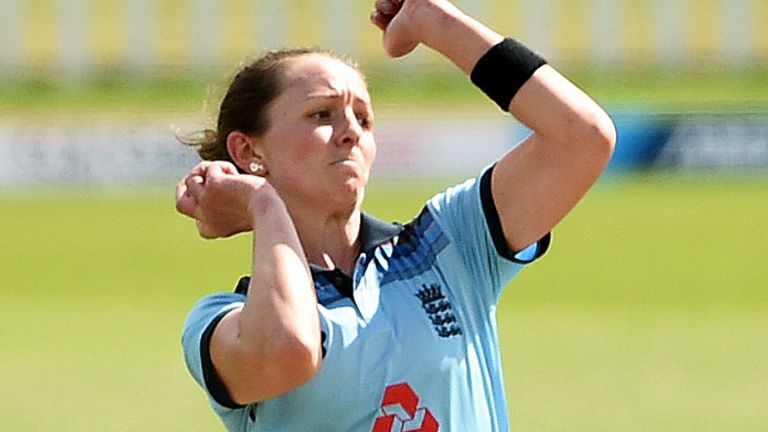England Women's Kate Cross says life in bio-secure bubble severely impacted her mental health
Seamer opens up in Mental Health Awareness Week about her struggles to help encourage others to seek help in difficult times; Cross says exercise, meditation, and sleeping well are amongst her main coping mechanisms as she lives with depression and anxiety
Thursday 13 May 2021 13:14, UK
England Women's Kate Cross says living in a bio-secure bubble during the COVID-19 pandemic last summer led to her mental health deteriorating so sharply that she "couldn't function".
Cross, who has struggled with anxiety and depression throughout her career, says she felt distraught during England's series against the West Indies and crippled by the fear of letting her team-mates down.
Speaking to the Professional Cricketers' Association as part of Mental Health Awareness Week, the 29-year-old hopes that opening up about her own struggles will encourage others to do the same and start taking positive steps for their own mental health.
"There was certainly a massive upside to the bubble because we got international cricket on, but the downsides were definitely also there for us as players," Cross told the PCA.
"I got really engrossed in the thought that I was going to let someone down if I left, even if I absolutely knew that I had to get out of there and our Head Coach Lisa (Keightley) was telling me to leave if I needed to.
"I remember having this inability to control my tears - I would get into my hotel room and just cry the entire time. That Derbyshire bubble last year was the worst that my mental health has been for four or five years - I couldn't function or do anything."
Cross recently shared a post on Twitter sharing her mental health decline in the bubble and stating: "I've realised over the years that it's not shameful to struggle sometimes".
She hopes her story will encourage others experiencing difficult times to seek out help.
"Finding that photo actually shocked me - I couldn't remember taking it, which people who have struggled with mental health will be able to identify with. You go through these phases of not being that present. I took the photo to remind myself of what I was going through at the time.
"I wanted to put this picture out there because my social media is a highlights reel, seeing all the really good sides to being a professional athlete.
"I thought that I had been through a difficult time in that bubble and really struggled on the back of it. Although I talk about mental health all the time on social media, I had never actually shown people what it looks like, and I think there was something quite powerful about how it looked.
"I've never had an experience where I've spoken openly about mental health and the reaction hasn't been overwhelmingly positive. I'm happy to talk about it openly and let people into that side of my life. The feedback I've always got is that it helps people, and if I can encourage one person to go to their GP and talk, it will always be worth it."
Cross, who has made 44 appearances for her country since turning professional in 2014 at the age of 22, says that self-awareness is crucial to helping her manage her own symptoms on a daily basis.
"The thing I've noticed with my mental health journey is how much it's evolved," Cross said.
"I remember when I parked the breakdown that I had in 2016 and 2017. I thought I had got over it and naively believed that I was never going to have that bad an experience again, but that didn't turn out to be the case.
"Everyone says to me that I have the best job in the world, and I absolutely do, but there's so much of the behind-the-scenes stuff that people don't see. They don't see all the training and getting up at 6am on a really horrible, rainy Manchester day to go out running.
"One of the things that sets the women's game apart from the men's is that we train down in Loughborough every week, meaning I'm away from my friends, family and support bubble in Manchester quite a lot.
"That's one of the differences that affects mental health in women's cricket and it's one of the biggest challenges that I've had to try and overcome."


